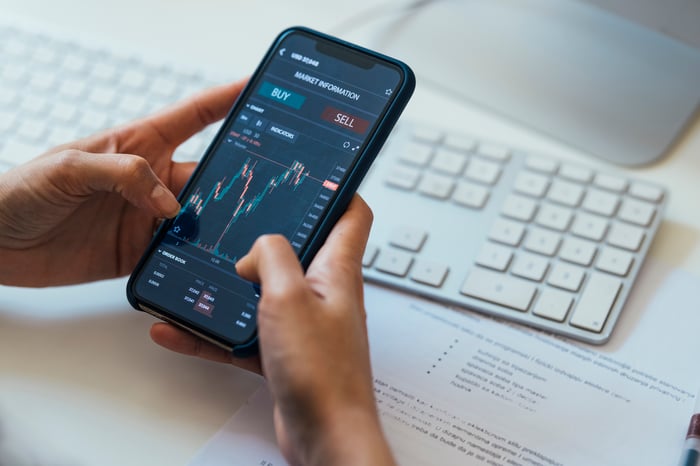|
|
|

|
|||||

|
|
Retail investors are accounting for a larger percentage of equities trading volume on Wall Street -- and online brokers are taking notice.
Though retail investors frequently gravitate to high-growth, brand-name businesses, Robinhood's online brokerage platform shows they also favor select exchange-traded funds (ETFs).
Three ETFs -- two of which are Vanguard ETFs -- are among the 10 most held securities on Robinhood by everyday investors.
While the advent and proliferation of the internet in the mid-1990s is credited with opening new doors for corporate America, it also paved the way for the rise of the retail investor.
Prior to the mid-1990s, stock market information came at a premium. Investors were forced to wait for annual reports to be mailed from public companies, and had to tune into the nightly news or read the morning paper to find out how their stock(s) performed. The internet broke down this information barrier and put Main Street and Wall Street on level ground. With the click of a button, everyday investors can pull up income statements, balance sheets, management commentary, and investor presentations.
Where to invest $1,000 right now? Our analyst team just revealed what they believe are the 10 best stocks to buy right now. Continue »

Image source: Getty Images.
Based on a study ("The Retail Investor Report") published by the University of Missouri – Kansas City School of Law from five authors, retail investors were responsible for almost 25% of equities trading volume on Wall Street in 2021, which nearly doubled where things stood a decade prior. Online brokers have taken note of this and are catering their platforms to court everyday investors.
The broker that's arguably had the most success luring retail investors is Robinhood Markets (NASDAQ: HOOD). Robinhood's platform offers commission-free trades for stocks on major U.S. exchanges, as well as the ability to purchase fractional shares of stock.
What's also noteworthy about Robinhood is its public "100 Most Popular" leaderboard, which displays the 100 most-held securities across its platform. Though retail investors undeniably favor high-profile companies and the occasional meme stock, you'd be surprised at how popular exchange-traded funds (ETFs) are.
ETF's typically hold a basket of securities and allow investors to diversify or concentrate their portfolios with the click of a button based on a laundry list of factors, which can include company size, growth versus value, or industry, to name a few. In exchange for this convenience, investors pay a fee, known as the net expense ratio, which represents the cumulative fees paid by investors that cover management/marketing expenses.
Three of the 10 most held securities on Robinhood by retail investors are ETFs, as of Sept. 9.
The sixth and ninth most held securities by everyday investors on Robinhood are, respectively, the Vanguard S&P 500 ETF (NYSEMKT: VOO) and SPDR S&P 500 ETF Trust (NYSEMKT: SPY). These are both index funds that attempt to mirror the performance of the benchmark S&P 500 (SNPINDEX: ^GSPC).
Every year, the analysts at Crestmont Research refresh a data set that calculates the 20-year rolling total returns, including dividends, of the S&P 500 since the start of the 20th century. Even though the S&P wasn't officially incepted until 1923, researchers were able to track the total return of its components in other major indexes from 1900 to 1923.
What Crestmont's analysis showed is that all 106 rolling 20-year periods it examined (1900-1919, 1901-1920, and so on, through 2005-2024) generated a positive annualized total return. Hypothetically speaking, because the first S&P 500 tracking fund didn't exist until 1993, if an investor had purchased an S&P 500 index fund at any point between 1900 and 2005 and held for 20 years, they would have generated a hearty profit every time. This is the closest thing you'll get to a guarantee on Wall Street -- and retail investors know it!
Although the Vanguard S&P 500 ETF and SPDR S&P 500 ETF Trust serve the same purpose, there is one noticeable difference between the two: their net expense ratios.
Index funds usually sport relatively low net expense ratios, and these two are no exception. However, the Vanguard S&P 500 ETF's net expense ratio of 0.03% is a third of the SPDR S&P 500 ETF Trust's 0.09%. A difference of six hundredths might not sound like much, but over multiple decades, or when dealing with a large investment, it can add up quickly. Only $0.30 of every $1,000 invested goes toward fees with the Vanguard S&P 500 ETF.

Image source: Getty Images.
The third ETF that lands among the 10 most held securities on Robinhood by retail investors is the Vanguard FTSE Developed Markets ETF (NYSEMKT: VEA). It's the 10th most-popular holding, right behind the SPDR S&P 500 ETF Trust.
The Vanguard FTSE Developed Markets ETF attempts to track the performance of the FTSE Developed All Cap ex. U.S. Index. In simpler terms, it's an investment vehicle that gives buyers exposure to large-, mid-, and small-cap companies located in Europe, Canada, and the Pacific region, not including the United States. It's delivered a nearly 4% annualized return since its inception in July 2007 (i.e., just before the Great Recession).
To keep with the theme, its net expense ratio is absolutely a lure. The Vanguard FTSE Developed Markets ETF matches the Vanguard S&P 500 ETF with a net expense ratio of just 0.03%. Investors are giving up very little of their capital for the convenience of closely mirroring the performance of this fund's underlying index. In comparison, similar funds have average expense ratios of 0.86%.
Another attractive aspect of the Vanguard FTSE Developed Markets ETF is its relative valuation compared to U.S. stocks. The S&P 500's Shiller price-to-earnings (P/E) Ratio shows this is the third-priciest stock market when back-tested over 150 years.
In comparison, the P/E ratio of the more than 3,800 companies that comprise the Vanguard FTSE Developed Markets ETF was a more reasonable 16.3 on July 31. If you expect international stocks to outperform U.S. stocks for the foreseeable future, this is a smart ETF to consider buying.
Before you buy stock in Vanguard S&P 500 ETF, consider this:
The Motley Fool Stock Advisor analyst team just identified what they believe are the 10 best stocks for investors to buy now… and Vanguard S&P 500 ETF wasn’t one of them. The 10 stocks that made the cut could produce monster returns in the coming years.
Consider when Netflix made this list on December 17, 2004... if you invested $1,000 at the time of our recommendation, you’d have $681,260!* Or when Nvidia made this list on April 15, 2005... if you invested $1,000 at the time of our recommendation, you’d have $1,046,676!*
Now, it’s worth noting Stock Advisor’s total average return is 1,066% — a market-crushing outperformance compared to 186% for the S&P 500. Don’t miss out on the latest top 10 list, available when you join Stock Advisor.
*Stock Advisor returns as of September 8, 2025
Sean Williams has no position in any of the stocks mentioned. The Motley Fool has positions in and recommends Vanguard S&P 500 ETF and Vanguard Tax-Managed Funds-Vanguard Ftse Developed Markets ETF. The Motley Fool has a disclosure policy.
| 24 min | |
| 59 min | |
| 3 hours | |
| 4 hours | |
| 6 hours | |
| Feb-26 | |
| Feb-26 | |
| Feb-26 | |
| Feb-26 | |
| Feb-26 | |
| Feb-26 | |
| Feb-26 | |
| Feb-26 | |
| Feb-26 | |
| Feb-26 |
Join thousands of traders who make more informed decisions with our premium features. Real-time quotes, advanced visualizations, backtesting, and much more.
Learn more about FINVIZ*Elite